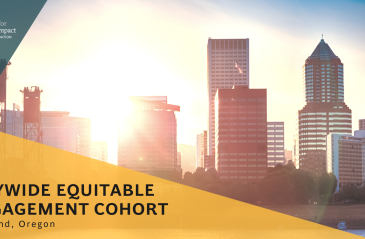
Five things we recently learned about difficult conversations

Legitimacy is the underlying relationship between citizens and government – and it's at risk, says @LenaKuenkel #FindingLegitimacy
Share articleChange is urgently needed if government wants to stay relevant in people’s lives, says @LenaKuenkel #FindingLegitimacy
Share articleGovernments need to get better at learning from citizens and from one another about how to build better relationships #FindingLegitimacy
Share articleWe put our vision for government into practice through learning partner projects that align with our values and help reimagine government so that it works for everyone.
Legitimacy is a fundamental component of public impact. Alongside Policy and Action, it is one of CPI's three Public Impact Fundamentals - it determines and drives the positive outcomes that government achieves for citizens.
In our global quest to understand what legitimacy means to citizens, we looked for examples from around the world where positive outcomes have been achieved because people and governments worked together hand-in-hand. We also sought to spotlight situations where governments took risks to explore new ways of building better relationships.
We think of legitimacy in this context as the underlying relationship between citizens and government - a relationship that is at risk today because of an apparent disconnect and a growing sense of mistrust.
Our #FindingLegitimacy project has helped us better understand why legitimacy is weak, and it has shown us that building a strong relationship between people and government requires care and attention. Some governments have responded to this crisis through increased public consultations or new consultation principles. However, legitimacy is about much more than consultation: our global conversations and research show that five behaviours are fundamental to strengthening legitimacy. Government must:
We like to think of these five behaviours in three categories: skills that can be learned, processes that can be developed, and engagement that is meaningful. Let's take a look at what this means in practice.
The ability of civil servants to empathise with people is a key determinant of how well services are designed, delivered and taken up. The first step for government is to acknowledge the value of this skill at all levels. In Bangladesh, for example, the prime minister's office recognised the need for all officials, regardless of their seniority, to attend empathy training. Officials leave their offices to experience public services from the user's point of view - an approach that has significantly changed and improved public service design.
Authenticity and the ability to connect with people is another core skill of government in the 21st century. To build better relationships, government needs to look and sound like the people they work for. Diversity within the civil service, time spent in the community, and relevant communication and social media skills are key areas that government needs to focus on today. This is not just a job for politicians. Regardless of seniority or where in government they work, this is a fundamental role for all civil servants. Authenticity lies at the heart of any relationship, and it fundamentally affects how the public feels about government.
In our research, conversations, and survey, we heard from people that delivering outcomes is not enough to build legitimacy. Citizens from around the world emphasised the need for government to get both outcomes and processes right.
"How are decisions made? What evidence was used? Who influenced this decision?" These are just some of the questions we heard repeatedly in our conversations. People care about processes, they want to understand what led to decisions - regardless of the level of government.
Progress has been made in many countries. At the city level, we were impressed by Kansas City, Missouri's open performance management. Using an online performance dashboard as well as regular public “Stat Meetings”, the mayor invites the public to scrutinise him and his team on their progress against city objectives.
At a national level, online platforms, such as Germany's abgeordnetenwatch.de, publish how MPs vote, what income they receive outside parliament, and how they engage with lobby groups. However, more work is required to turn open data and transparency initiatives into tools that are easily accessible to all, into platforms that allow and encourage two-way communication.
"We no longer want to be ‘consulted'. We are tired of sharing our views and never seeing them have an influence on actual decisions." To strengthen legitimacy, governments need to put an end to lengthy town hall meetings, online consultations without follow-ups, and specialist commissions whose recommendations are ignored. It is time to start a new form of engagement, one that involves a genuine dialogue with citizens, who can see that their views shape and influence decisions.
Change is already occurring in some parts of the world. In Melbourne, for example, a citizens' jury was tasked with developing recommendations for an A$5 billion plan for the City of Melbourne's spending strategy over the coming decade. Following analysis and consideration, the city council agreed to embed most of these ideas in the final 10-year financial plan. Similar initiatives exist at the national level. In Portugal, for example, a nationwide participatory budgeting process allowed citizens from all regions to suggest initiatives and vote on how national funds were allocated across projects.
Engagement is also important when it comes to building a vision together. Working with citizens towards a shared objective - and giving them an idea of what can be achieved together - serves to drive cohesion. And vision-building doesn't stop at the design phase: investing effort in the shared execution of a vision is just as important. Seoul has been a leading light in this context: to ensure that all members of society understand and value the city's vision of becoming a digital leader, secondhand smartphones have been distributed to poorer members of society, allowing them to have their say by using one of the many new free wifi hotspots.
Our research shows that the relationship between governments and citizens is at breaking point. Change is needed now and governments should not be waiting for the next crisis to take action.
We, at CPI, believe that it is possible to build legitimacy, and we found examples of this all over the world, often in places that we didn't expect. There is a lot that governments can learn from citizens - and from one another - about how to build better relationships, and who within the machinery of government should take a leading role in this initiative.
Our new report offers some early guidance and, we hope, inspiration. We believe that building legitimacy is a crucial task for all of government - from the most senior civil servants and politicians to everyone on the frontline.
What is legitimacy to you? Where do you see legitimacy working well? How governments work with citizens to build legitimacy is a big question for CPI.
Find out how to get involved in our Finding Legitimacy project











